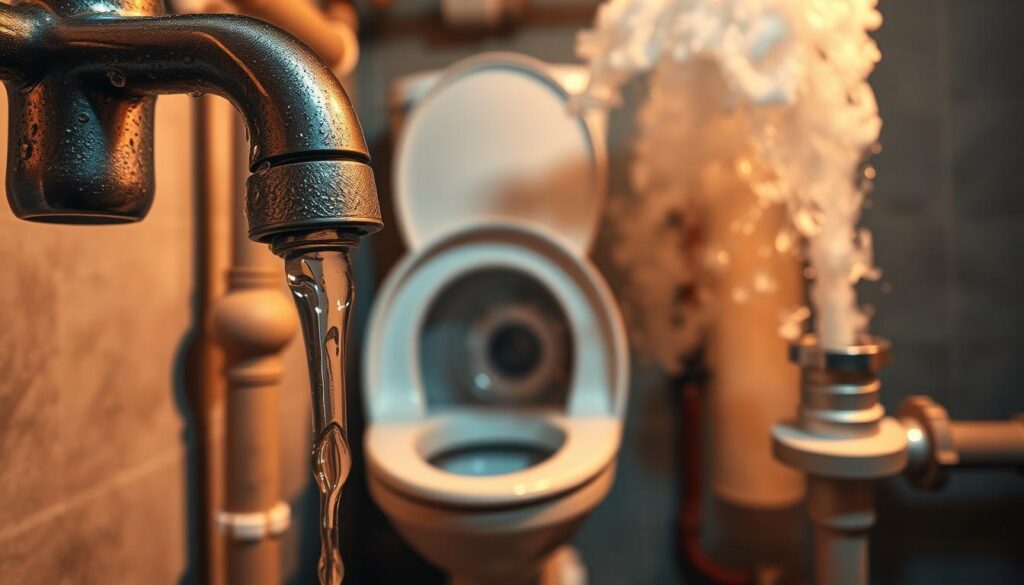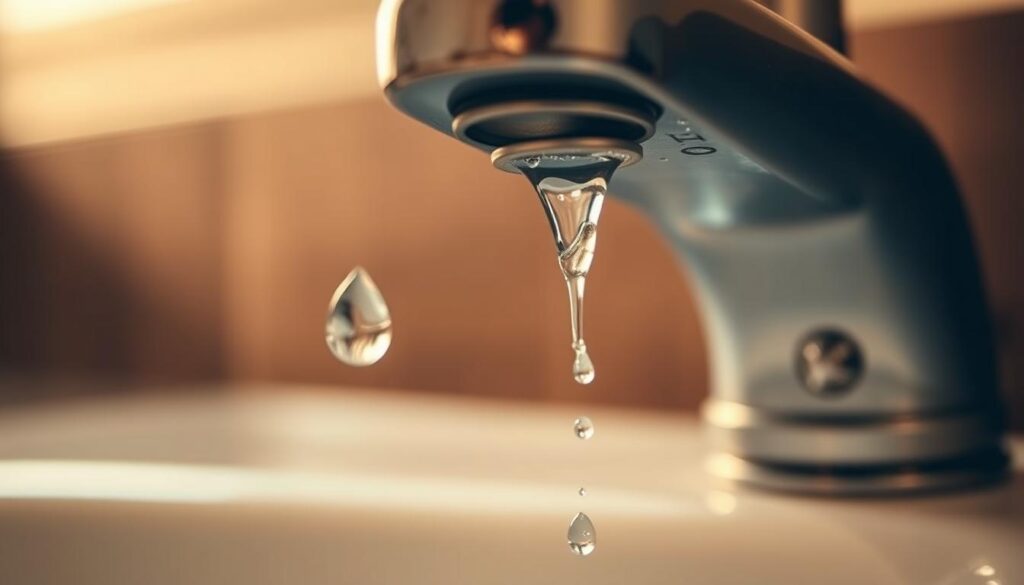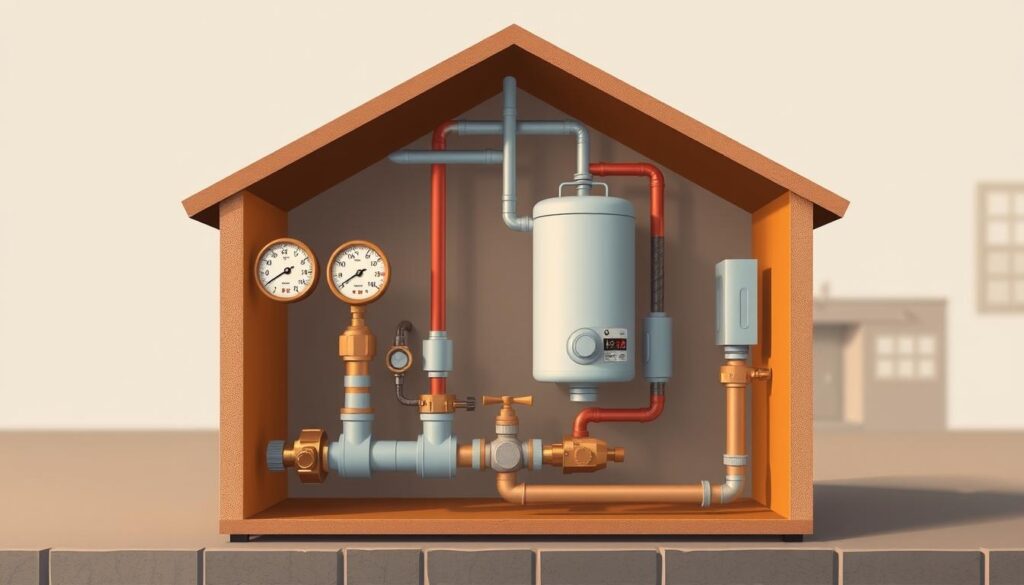Affiliate Disclosure
Plumber Guide Guys is a participant in the Amazon Services LLC Associates Program, an affiliate advertising program designed to provide a means for sites to earn advertising fees by advertising and linking to Amazon.
Why Does My Plumbing Sound Like a Foghorn? Ever been startled by a loud foghorn sound coming from your plumbing? These noises aren’t just annoying. They might be warning signs of serious plumbing problems that need your quick attention.

Plumbing system noises can be confusing, like maritime sound signals. Your home’s pipes, drains, and water lines can make strange sounds. These sounds can worry homeowners about possible damage.
It’s important to understand why your plumbing sounds like a foghorn. These sounds often mean there’s a problem with your water lines, toilet, or pressure system. You need to investigate these issues carefully.
Key Takeaways
- Foghorn-like plumbing sounds are not normal and should be investigated
- Various factors can cause unusual plumbing noises
- Ignoring these sounds might lead to expensive repairs
- Professional assessment can help diagnose the root cause
- Regular maintenance prevents unexpected plumbing disruptions
Table of Contents
Understanding Plumbing Noises and Their Significance
Your home’s plumbing system talks to you through sounds. Learning to understand these loud noises can save you from expensive fixes. Noisy water pipes are more than just a nuisance; they’re warning signs that need your attention.
Plumbing systems are made up of many parts like pipes, valves, and connections. These parts can make different sounds that show different problems. Catching these sounds early can stop big damage to your home.
Common Types of Plumbing Sounds
- Whistling sounds: Possible valve or pipe pressure problems
- Banging noises: Could be due to water hammer effect
- Gurgling: Shows drain or ventilation blockages
- Foghorn-like sounds: May point to water pressure or valve issues
Why Plumbing Noises Shouldn’t Be Ignored
Ignoring loud water pipes can lead to bigger problems. These sounds often mean there’s something wrong that needs fixing. If not fixed, it could cause:
- Pipe damage
- Water pressure issues
- Flooding risks
- Higher utility bills
“A strange sound today could mean a significant repair tomorrow.” – Professional Plumbing Association
Impact on Your Home’s Plumbing System
Constant loud noises can weaken your plumbing system over time. They show stress points that could harm your home’s water system.
| Noise Type | Potential Cause | Recommended Action |
|---|---|---|
| High-pitched whistle | Worn washers or valves | Inspect and replace components |
| Banging | Water hammer effect | Install water hammer arrestors |
| Foghorn sound | Pressure fluctuations | Check pressure regulator |
Early detection and professional assessment can prevent minor sounds from becoming major plumbing catastrophes.
Why Does My Plumbing Sound Like a Foghorn?
When your plumbing makes a loud, eerie foghorn sound, it feels like a maritime nightmare at home. This noise isn’t just annoying. It’s a warning that something might be wrong with your plumbing.
The foghorn sound in pipes can come from a few issues:
- Water pressure problems
- Worn-out toilet components
- Loose pipe connections
- Damaged valve mechanisms
To figure out why your plumbing sounds like a foghorn, you need to do some detective work. These unexpected sounds often show that there’s mechanical stress in your water system. The loud noise happens when water tries to move through restricted or damaged passages.
“A foghorn sound is your plumbing’s way of crying out for help.” – Plumbing Expert
If you hear these mysterious noises, listen closely. The foghorn sound in pipes is not just background noise. It’s a warning that needs to be checked right away to avoid expensive damage to your home’s plumbing.
Each sound gives clues about possible problems. Whether it’s a high-pitched whine or a deep, thunderous boom, your plumbing is trying to tell you something important about its condition.
The Science Behind Water Hammer Effect
Water hammer noise is a startling plumbing phenomenon. It can send loud pipe banging sounds echoing through your home’s walls. This unexpected acoustic event occurs when water flow is suddenly interrupted, creating a dramatic impact within your piping system.
Imagine water rushing through your pipes at high velocity. When a valve closes abruptly, that fast-moving water has nowhere to go. The sudden stop creates a massive pressure wave that slams against pipe walls, generating those alarming banging sounds you hear.
How Water Pressure Creates Banging Sounds
Water hammer noise results from basic physics principles. The kinetic energy of moving water transforms into a shock wave when unexpectedly blocked. This process can cause significant stress on your plumbing infrastructure.
- Rapid water flow acceleration
- Sudden valve or faucet closure
- Intense pressure buildup
- Dramatic pipe wall impact
Impact of Sudden Water Flow Stoppage
Repeated water hammer events can potentially damage your pipes. They can loosen connections and create long-term plumbing vulnerabilities. The force generated by these pipe banging sounds isn’t just noisy—it’s potentially destructive.
Prevention Methods for Water Hammer
Protecting your plumbing from water hammer involves strategic interventions. Consider installing water hammer arrestors. These devices absorb the shock wave and prevent destructive pressure fluctuations in your piping system.
- Install pressure-reducing valves
- Use water hammer arrestors
- Secure loose pipe supports
- Reduce water pressure
Understanding and addressing water hammer can save you from costly pipe repairs. It helps maintain a peaceful, well-functioning plumbing system.
Compromised Toilet Ballcock: A Common Culprit
Ever wondered why your plumbing sounds like a foghorn? It might be the toilet ballcock. This small part in your toilet tank controls water flow.
A bad ballcock can turn your quiet bathroom into a noisy place. It makes water pipe foghorn sounds when it goes wrong. These sounds are annoying and show there’s a plumbing problem.
- Identifies water flow problems
- Prevents tank overflow
- Regulates water filling process
Recognizing a compromised ballcock involves listening for specific warning signs:
- Continuous water running sound
- Intermittent whistling or foghorn-like noises
- Inconsistent tank filling
“A faulty ballcock can waste water and increase utility bills if left unaddressed.” – Plumbing Maintenance Experts
If you’re handy, you can fix a bad ballcock yourself. You’ll need basic tools. First, turn off the water supply. Then, remove the old valve and put in a new one. This should stop the annoying foghorn sounds.
Investigating Toilet Tank Leakage Problems
Toilet tank issues can turn your peaceful home into a noisy plumbing nightmare. It’s important to understand how leaks cause these sounds. This helps keep your plumbing system quiet and efficient.
Toilet tank leaks can make your home’s pipes noisy. These sounds often mean there’s a problem that needs fixing right away.
Signs of Tank Deterioration
- Constant water running sound
- Visible cracks in the tank
- Unexplained water puddles near toilet base
- Unusual whistling or foghorn-like noises
How Leaks Contribute to Foghorn Sounds
Worn-out toilet parts can make strange noises. A damaged rubber flapper can cause water to keep flowing. This makes sounds like a foghorn because water keeps entering the tank without sealing.
Solutions for Tank Leakage Issues
Fixing toilet tank leaks involves several steps:
- Inspect the tank’s internal components
- Replace worn-out flappers
- Check water pressure levels
- Tighten loose connections
“A small leak can create significant noise and potentially cause water damage if ignored.” – Plumbing Maintenance Expert
| Problem | Potential Cause | Recommended Action |
|---|---|---|
| Constant Running | Worn Flapper | Replace Flapper |
| Whistling Sound | High Water Pressure | Install Pressure Reducer |
| Tank Leakage | Cracked Components | Professional Inspection |
Regular maintenance is key to avoiding noisy plumbing. Checking your system often can catch and fix problems before they get worse.
Loose Faucets and Their Role in Plumbing Noises

Loud plumbing noises can come from a simple issue: a loose faucet. If your faucet isn’t tight, it can make unexpected sounds. These sounds can travel through your home’s pipes.
To fix these sounds, you need to find the cause. These noises happen when water pressure makes the faucet vibrate. It rattles against nearby fixtures.
- Check for visible movement in your faucet handle
- Listen for whistling or high-pitched sounds when water runs
- Inspect mounting nuts and connections for possible looseness
Your faucet’s state affects the sound in your plumbing. Loose parts can turn a simple water flow into loud noises.
| Faucet Type | Likelihood of Noise | Recommended Action |
|---|---|---|
| Kitchen Sink Faucet | High | Tighten mounting hardware |
| Bathroom Vanity Faucet | Medium | Check washer condition |
| Outdoor Spigot | Low | Replace if significant wear |
Experts say to check your faucets often to avoid these noises. Fixing loose faucets early can stop most loud noises. This way, you avoid bigger problems later.
Understanding Thermal Expansion in Plumbing Systems
Your home’s plumbing system changes a bit with temperature changes. Thermal expansion is key and can cause strange noises, like the water pipe foghorn sound. This sound might surprise you.
When it gets hotter or colder, pipes and parts expand and shrink. This natural change can put stress on your plumbing. It might make odd sounds and even damage your pipes.
Effects of Temperature Changes
Temperature changes affect your plumbing in important ways:
- Metal pipes expand and contract with heat and cold
- Connections between pipes can become slightly loose
- Pressure variations can trigger water pipe foghorn sounds
- Rapid temperature changes increase mechanical stress
Prevention and Solutions
To protect your plumbing from thermal expansion, you need to take steps:
- Install expansion tanks to absorb pressure changes
- Use flexible pipe connectors
- Insulate pipes in areas with extreme temperature variations
- Regularly inspect pipe connections and supports
“Proactive maintenance can prevent 90% of thermal expansion-related plumbing system noises.”
Understanding and tackling thermal expansion can greatly reduce plumbing system noises. It also helps protect your home’s water system.
Dishwasher-Related Plumbing Sounds
Your dishwasher might be the unexpected source of those mysterious foghorn-like sounds in your plumbing system. When your plumbing sounds like a foghorn, the culprit could be hiding right in your kitchen appliance.
Noisy water pipes connected to your dishwasher often stem from specific mechanical issues. The solenoid fill valve plays a critical role in creating these disruptive sounds. This small but vital component controls water flow and can generate unusual noises when malfunctioning.
- Faulty solenoid fill valve causing irregular water flow
- Valve misalignment creating pressure inconsistencies
- Worn-out valve components producing loud sounds
Identifying the root cause of dishwasher-related plumbing sounds requires careful inspection. Unusual vibrations, high-pitched whistling, or persistent foghorn-like noises are clear indicators that something might be wrong with your dishwasher’s water intake mechanism.
Professional plumbers recommend checking your dishwasher’s fill valve periodically. Solutions include valve replacement, pressure adjustment, or a complete system evaluation to eliminate noisy water pipes permanently.
Pro Tip: Regular maintenance can prevent unexpected plumbing sounds and extend your dishwasher’s lifespan.
How Water Pressure Affects Plumbing Sounds
Water pressure is key in making pipe banging sounds and water hammer noise in your home. Knowing how pressure affects your pipes can help avoid loud and damaging plumbing problems.

Most homes have plumbing systems that face pressure changes. These changes can cause different sounds, from soft vibrations to loud noises.
Optimal Water Pressure Levels
Keeping the right water pressure is important to stop pipe banging sounds. Experts say certain pressure levels are best for smooth plumbing:
- Ideal pressure range: 40-60 pounds per square inch (psi)
- Maximum recommended pressure: 80 psi
- Minimum recommended pressure: 30 psi
Pressure Reduction Solutions
If you hear water hammer noise, try these solutions:
- Install a pressure-reducing valve
- Check existing valve functionality
- Conduct regular pressure tests
- Consult a professional plumber for precise diagnostics
Managing water pressure well can greatly lessen plumbing sounds and protect your home.
Professional Solutions for Foghorn Sounds
When you can’t fix plumbing sounds yourself, it’s time to call a pro. Sounds from your plumbing system can mean serious problems that need a skilled eye.
“Not all plumbing problems are DIY-friendly. Sometimes, professional expertise is your best solution.” – Master Plumbers Association
Professional plumbers have the tools and know-how to tackle tough plumbing sounds. They can spot problems that you might miss.
- Comprehensive system inspection
- Advanced diagnostic equipment
- Precise problem identification
- Long-term repair strategies
Looking for a pro to fix your plumbing sounds? Here’s what to check:
- Verify licensed and insured status
- Check customer reviews and ratings
- Request detailed cost estimates
- Confirm experience with specific plumbing system noises
Pro tip: Keep notes on when and where you hear the sounds. This helps your plumber find the problem faster.
Getting a pro to check your plumbing can save you money and keep your home safe.
Preventive Maintenance Tips
Keeping your home’s plumbing system quiet is key. Regular care and maintenance are essential. Fixing plumbing sounds early can save you a lot of time and money.
Regular maintenance stops those loud, foghorn-like sounds. With a smart plan, your plumbing will work quietly and smoothly.
- Inspect water pressure monthly using a pressure gauge
- Check pipe connections for possible leaks
- Listen for unusual sounds when water flows
- Examine toilet tank components annually
- Clean faucet aerators to prevent mineral buildup
Knowing why your pipes are noisy helps you act fast. Early detection is key to avoiding costly repairs.
| Maintenance Task | Frequency | Purpose |
|---|---|---|
| Water Pressure Check | Monthly | Prevent water hammer effect |
| Pipe Inspection | Quarterly | Identify possible leaks |
| Faucet Aerator Cleaning | Every 6 months | Reduce mineral buildup |
Think about getting a professional plumbing check-up every year. This can catch problems early and save you from big, expensive fixes.
Conclusion
Knowing why your plumbing sounds like a foghorn is key to a healthy home. The strange noises from your pipes are not just annoying. They warn of hidden problems in your plumbing.
To fix these sounds, you need to act fast. Issues like water hammer, toilet tank problems, or uneven pressure can cause them. Finding the cause early can save you from expensive fixes and water damage.
Listen to your plumbing’s signals. If it sounds like a foghorn, it’s trying to tell you something. A plumber will check your system regularly and fix any issues quickly.
Preventing problems is cheaper than fixing them. By listening to your plumbing, you can keep your water system working well. This means less noise and more peace in your home.
FAQ
Why does my plumbing sound like a foghorn?
Is a foghorn sound in my pipes dangerous?
Can I fix the foghorn sound in my pipes myself?
How do I know if the sound is caused by water hammer?
What can cause a continuous foghorn-like noise in my toilet?
How expensive is it to fix foghorn sounds in plumbing?
Why does my plumbing sound like a foghorn?
Is a foghorn sound in my pipes dangerous?
Can I fix the foghorn sound in my pipes myself?
How do I know if the sound is caused by water hammer?
What can cause a continuous foghorn-like noise in my toilet?
How expensive is it to fix foghorn sounds in plumbing?
FAQ
Why does my plumbing sound like a foghorn?
Foghorn sounds in your plumbing can come from several sources. These include water hammer, toilet ballcock problems, tank leaks, loose faucets, thermal expansion, or too much water pressure. These noises often signal deeper plumbing issues that need fixing.
Is a foghorn sound in my pipes dangerous?
Foghorn sounds in your pipes are not immediately dangerous. But, they can mean serious plumbing problems. These problems might damage your pipes and plumbing system. It’s vital to find and fix the cause to avoid bigger and more expensive repairs.
Can I fix the foghorn sound in my pipes myself?
Homeowners can fix some issues, like tightening faucets or checking toilet ballcocks. But, complex problems like water hammer or big pipe issues need a pro plumber.
How do I know if the sound is caused by water hammer?
Water hammer makes a loud banging sound when water stops suddenly. It happens when water pressure changes quickly in your pipes. Look for loud noises when turning off faucets or when appliances stop using water.
What can cause a continuous foghorn-like noise in my toilet?
A constant foghorn sound in your toilet usually means a bad ballcock or fill valve. This can be due to worn parts, wrong water pressure, or leaks. The sound means water keeps flowing or has trouble filling the tank.
How expensive is it to fix foghorn sounds in plumbing?
Fixing costs vary based on the problem. Simple fixes like a new ballcock might cost less than 0. But, bigger issues like water pressure or pipe repairs can cost 0 to
FAQ
Why does my plumbing sound like a foghorn?
Foghorn sounds in your plumbing can come from several sources. These include water hammer, toilet ballcock problems, tank leaks, loose faucets, thermal expansion, or too much water pressure. These noises often signal deeper plumbing issues that need fixing.
Is a foghorn sound in my pipes dangerous?
Foghorn sounds in your pipes are not immediately dangerous. But, they can mean serious plumbing problems. These problems might damage your pipes and plumbing system. It’s vital to find and fix the cause to avoid bigger and more expensive repairs.
Can I fix the foghorn sound in my pipes myself?
Homeowners can fix some issues, like tightening faucets or checking toilet ballcocks. But, complex problems like water hammer or big pipe issues need a pro plumber.
How do I know if the sound is caused by water hammer?
Water hammer makes a loud banging sound when water stops suddenly. It happens when water pressure changes quickly in your pipes. Look for loud noises when turning off faucets or when appliances stop using water.
What can cause a continuous foghorn-like noise in my toilet?
A constant foghorn sound in your toilet usually means a bad ballcock or fill valve. This can be due to worn parts, wrong water pressure, or leaks. The sound means water keeps flowing or has trouble filling the tank.
How expensive is it to fix foghorn sounds in plumbing?
Fixing costs vary based on the problem. Simple fixes like a new ballcock might cost less than $100. But, bigger issues like water pressure or pipe repairs can cost $200 to $1,000 or more.
Can high water pressure cause foghorn-like sounds?
Yes, too much water pressure can make your pipes noisy. Normal pressure is 40-80 PSI. Pressures over 80 PSI can cause vibrations and loud noises, possibly harming your plumbing.
How can I prevent foghorn sounds in my plumbing?
Keeping your plumbing in check is essential. Check water pressure, inspect toilet parts, and tighten loose pipes. Also, keep pipes insulated and fix leaks or odd sounds quickly. Installing pressure-reducing valves and expansion tanks can help prevent problems.
,000 or more.
Can high water pressure cause foghorn-like sounds?
Yes, too much water pressure can make your pipes noisy. Normal pressure is 40-80 PSI. Pressures over 80 PSI can cause vibrations and loud noises, possibly harming your plumbing.
How can I prevent foghorn sounds in my plumbing?
Keeping your plumbing in check is essential. Check water pressure, inspect toilet parts, and tighten loose pipes. Also, keep pipes insulated and fix leaks or odd sounds quickly. Installing pressure-reducing valves and expansion tanks can help prevent problems.

